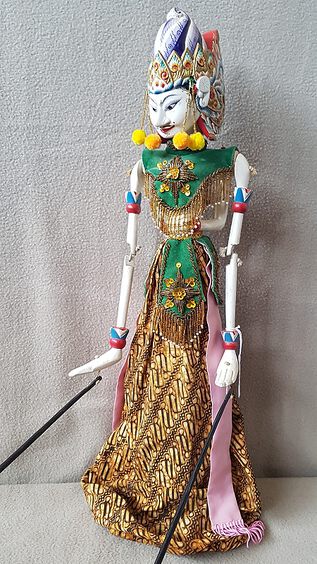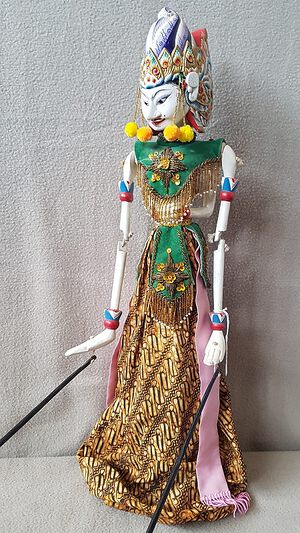Siwa
| Title | Siwa - (Sanghyang - Batara) - All stories |
|---|---|
| Other names | Batara Guru, Dewaraja, Girinata, Mahadewa, Manikmaya, Pramesti, Yang Utipati, Padawinenang, Sukma, Jagadkarana, Jagadpratinka, Jagadnata, Kiritarupa, Jagadgirinata, Iswara, Nalakanta |
| Size | 60 cm |
| Personal data | In the Paramayoga manuscript, it is told that Sanghyang Tunggal married the Goddess Rakti, the daughter of the crab genie king named Sanghyang Yuyut. Goddess Rakti gave birth to an egg-shaped mustika egg which later turned into two men. Both were named Ismaya (Semar) for the black and Manikmaya (Siwa) for the white. Manikmaya (Siwa) inherited the throne of heaven and the title of Batara Guru, while Ismaya (Semar) was only given the position of ruler of the Sunyaruri realm (the abode of ethereal beings). Batara Guru is the god who rules heaven (king of the gods). He has a wife named Dewi Uma. Batara Guru has a vehicle animal, namely the Ox Nandini. The sons of Batara Guru are Batara Sambu, Batara Brahma, Batara Indra, Batara Bayu, Batara Vishnu, Batara Ganesha, Batara Kala and Hanoman. |
| Appearance | The eyes are stitched (the shape is as if sewn). Demil-shaped eyes in Javanese are called njait. His nose is pointed, his mouth is closed. His hands are four, and two are clasped while the other two hold a Trident and an arrow. It stands on the Andhini Cow. Further, he was crowned with a mask, wearing a three-tiered hat, wearing a garuda on his back, wearing a wader, wearing a scarf and cloth. |
| Collection | Private collection |
Siwa - (Sanghyang - Batara) - All stories
Manikmaya glows sparkling white. Hyang Tunggal said, that Manikmaya will one day rule this world, because of his supernatural powers and good looks. After Manikmaya received such words, he felt proud and felt that he was flawless. This feeling was known from Hyang Tunggal and he also said, "Hey, Manikmaya, know that you will get a defect on yourself, which is in the form of stripes on your neck, weakness in your legs, slyness in your mouth and four hands." Manikmaya regretted and felt guilty, that he had felt so lost in his heart. The words of Hyang Tunggal have indeed come true.
When the Prophet Isa was born, Manikmaya came to witness. Because he saw that a month old baby could not yet walk, a situation that was very different from that of the Gods, he considered what he witnessed as something imperfect. Immediately, Manikmaya suffered a plague and his left leg became weak.
One time Manikmaya felt very thirsty. Then he saw a lake with very clear water. He immediately drank the water from the lake, but it turned out that the water was poisonous, so he immediately vomited the lake water. Instantly Manikmaya got a spot on his neck.
One time Batara Guru had an argument with his wife Dewi Uma. Out of anger, they both cursed each other, Dewi Uma cursed Batara Guru so that he would grow up like a monster, then instantly Manikmaya would grow up. When Hyang Manikmaya saw people praying by covering their clothes, he laughed because he thought that the person had four hands. At that moment, Hyang Manikmaya's body got four arms. It is a belief in wayang that Hyang Manikmaya symbolizes the subtlety of the human mind. Betara Guru's wrath is mentioned in the play Sasikirna. The short story is as follows: Astina's national palace admits a magical thief who wants to meet Dewi Dursilawati, the daughter of King Suyudana. The thief is so powerful that no one can defeat him. Even gods can't.
There is Raden Caranggana in Awu-awu Langit, the son of Raden Arjuna who came to Dwarawati country in an attempt to meet his father. Sri Kresna said that Raden Arjuna would recognize Caranggana as his son, if he could catch the thief in Astina. Raden Caranggana managed to catch the real thief who was none other than Betara Guru. Here we find evidence that human inner strength, which is misused, will eventually be defeated by the truth. So, figuratively speaking, the mind can lead in the wrong and incorrect direction. Betara Guru can act as an ordinary human being with all his shortcomings.
Hyang Guru was once king in Medangkemulan, with the title Sri Paduka Raja Mahadewabuda. The reason why Manikmaya is called a Guru is because he tried to develop Buddhism. Many of Betara Guru's names stem from his power, but Hyang Tunggal was not allowed to use the name Sang Hyang Wenang, because Guru's power was still limited. Wenang means unlimited power.
Wayang Betara Guru romances three faces: Karna, Cancihi, and Gana.
It is said that according to people's stories, Betara Guru wayang was created by Panembahan Senapati in Mataram and was intended as a candrasangkala (calculation of year numbers). The sentence that states the time of making the wayang reads Dewi dadi ngecis earth and is the same as 1451 Javanese years. According to Javanese beliefs, especially puppeteer beliefs, the Betara Guru wayang is highly respected and is considered the most sacred wayang. For this reason, the Betara Guru puppet is differentiated from other puppets. For example, only the Betara Guru puppet is covered in beautiful cloth. Likewise, before being played, this puppet is first exposed to incense smoke and people are afraid to step over the banana stem used to attach Betara Guru's puppet.
Andhini's Cow
The Andhini cow is a female cow, the son of a genie king named Patanam. Because he wanted to dominate this world, he became a hermit and was worshiped by the people around him. Finally, people thought that the Andhini Cow was also a God.
Betara Guru knows this. So he defeated Andhini's Cow and made him a vehicle that was inseparable from him, even one soul with him. But Lembu Andhini did not feel comfortable being treated like that and he relentlessly tried to take revenge. Finally Lembu Andhini found the sense to dispute Betara Guru with his queen, until they went to war. After his queen was defeated, Betara Guru came to know that his war with his queen was due to Andhini's own actions. Become the wrath of Betara Guru. He cursed the Andhini Cow until it turned into a rainbow. Superstition says that the rainbow has the head of an ox and if it is visible then the Andhini ox is drinking sea water.
After losing his vehicle, Betara Guru felt weak, but he soon got a bull named Andana, the son of a giant named Gopatama. Then he changed the name Andana to Andhini like the original vehicle. Forest oxen are called bulls and are bigger and stronger than ordinary oxen. In wayang stories, a bull that is angry because it is injured is more dangerous than an ordinary bull. Therefore, someone who fights bravely is likened to a wounded bull or in Javanese: Lir bull ketaman kanin. Many sculptures in the form of cows lying down which are certainly inspired by the Andhini Cow.
According to the story, in the olden days cows were used as vehicles, because cows were very obedient and strong to walk in difficult places, so they were suitable to be used as vehicles for priests. The word cow is also widely used in the names of famous people. Like, for example, Lembuamiluhur, a king in the country of Jenggala; Lembupeteng, a descendant of a king who lives in hiding and Lembusura, a giant king in Kiskenda Cave, and others.
Source: History of Wayang Purwa - Hardjowirogo - PN Balai Pustaka - 1982
Blog: Hadisukirno – Yogyakarta - 2011


